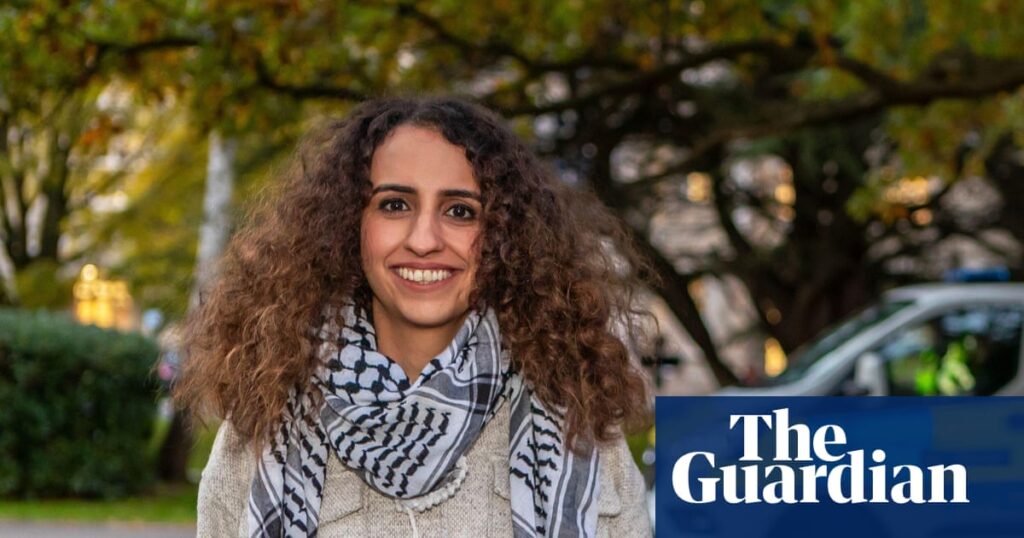The co-founder of Palestine Action can bring an unprecedented legal challenge to the home secretary’s decision to ban the group under anti-terrorism laws, a high court judge has ruled.
Mr Justice Chamberlain said the proscription order against the direct action group risked “considerable harm to the public interest” because of a potential “chilling effect” on legitimate political speech.
The judge cited the case of Laura Murton, who the Guardian revealed had been threatened with arrest by armed officers for holding a sign saying “Free Gaza” and a Palestinian flag.
Chamberlain’s decision is the first time that an organisation banned under anti-terrorism law has been granted a court trial to challenge proscription.
The judge said: “If, as the claimant says, the proscription order is likely to have a significant chilling effect on the legitimate political speech of many thousands of people, that would do considerable harm to the public interest.
“Reports of the kind of police conduct referred to … are liable to have a chilling effect on those wishing to express legitimate political views. This effect can properly be regarded as an indirect consequence of the proscription order.”
He continued: “I consider it reasonably arguable that the proscription order amounts to a disproportionate interference with the article 10 and article 11 (European convention of human rights) rights (freedom of expression and assembly, respectively) of the claimant and others.”
The group’s co-founder, Huda Ammori, called it a “landmark decision … especially at a time when protesters – mostly elderly citizens – are being dragged off in police vans, held in detention for more than 24 hours, having their homes raided and face criminal prosecution, simply for holding signs that they oppose genocide and expressing their support for Palestine Action”.
More than 200 people are believed to have been arrested since the 5 July ban on Palestine Action, the first on a direct action group, placing it alongside the likes of Islamic State and Boko Haram.
The three-day hearing in November will increase scrutiny on the decision-making of the home secretary, Yvette Cooper, and casts uncertainty over the fate of those recently arrested under the Terrorism Act in relation to Palestine Action – or who might be arrested in future.
The Home Office had argued that the proper forum for Palestine Action to challenge the ban was the POAC (Proscribed Organisations Appeal Commission), which parliament had designated precisely for that purpose, rather than judicial review.
But Chamberlain said POAC would be unlikely to be able to hear the case before the middle of next year whereas a judicial review could be heard this autumn and there was a strong public interest for it to be determined authoritatively as soon as possible.
Otherwise, people charged with criminal offences under the Terrorism Act might seek to challenge the legality of the proscription order in courts that might reach different decisions, creating “a recipe for chaos”, he said.
The second ground on which Chamberlain granted permission for judicial review, in addition to concerns about freedom of speech and protest, was that Cooper had not consulted Palestine Action before proscribing it, finding it reasonably arguable that there was a duty to consult.
The judge refused Ammori permission to challenge the government on six other grounds, including a claim that the home secretary had failed to gather sufficient information on Palestine Action’s activities or the impact of the proscription on people associated with the group.
Chamberlain referred in his judgment to the “deteriorating humanitarian situation in Gaza”. He quoted from a joint statement last week by the foreign secretary, David Lammy, and the foreign ministers of 27 other countries in which they said “the suffering of civilians in Gaza has reached new depths”.
after newsletter promotion
Documents in the case showed that Cooper held private discussions with aides for three months before she took the decision to ban Palestine Action. On one occasion, she decided to ban the group but reversed course two days later.
She finally decided to ban the group on 20 June, hours after Palestine Action said its members had broken into the RAF’s Brize Norton airbase and defaced two military aircraft with spray paint.
On 7 March, the Joint Terrorism Analysis Centre (JTAC), a government body based within MI5, produced a secret report. It concluded that the majority of Palestine Action’s activities would not be classified as terrorism on the grounds that the group “primarily uses direct action tactics”, which typically resulted in minor damage to property. “Common tactics include graffiti, petty vandalism, occupation and lock-ons,” it added.
Nonetheless JTAC concluded that Palestine Action should be banned, arguing that its protests had been escalating, citing three protests it said constituted acts of terrorism.
Whitehall officials supported a ban too, but conceded that proscribing the group would be “relatively novel” as “there was no known precedent of an organisation being proscribed on the basis that it was concerned in terrorism mainly due to its use or threat of action involving series damage to property”.
From late March officials recommended on a series of occasions that the group be banned, but Cooper made no firm decision, often requesting more information. On 14 May she backed the ban but two days later delayed implementing it as she wanted more details on Palestine Action’s recent activities.
A Whitehall minute recorded that by 2.15pm on 20 June, Cooper had decided that Palestine Action was to be banned “at pace”.
An application by Ammori’s lawyers to suspend the effect of the proscription order until the trial has taken place in November was rejected by Chamberlain. The judge also refused a request by the Home Office to bring an appeal over his decision about POAC.
At last week’s hearing, lawyers for Ammori also highlighted the arrest of a man in Leeds for carrying a placard reproducing a graphic from Private Eye magazine, which said: “Unacceptable Palestine Action: spraying military planes. Acceptable Palestine Action: shooting Palestinians queueing for food.”

